Death and state funeral of Kim Jong-il
The death of Kim Jong-il was reported by North Korean state television news on 19 December 2011.[1] The presenter Ri Chun-hee announced that he had died on 17 December at 8:32 am of a massive heart attack while travelling by train to an area outside Pyongyang. Reportedly, he had received medical treatment for cardiac and cerebrovascular diseases. During the trip though, he was said to have had an advanced acute myocardial infarction, complicated with a serious heart shock.[2][3]
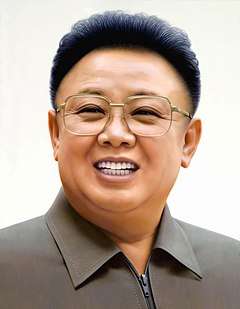 Official portrait of Kim Jong-il | |
| Date | 17–29 December 2011 |
|---|---|
| Location | Pyongyang, North Korea |
Part of a series on the |
||||||||||||||||||||||||||||||||||||||||||
|---|---|---|---|---|---|---|---|---|---|---|---|---|---|---|---|---|---|---|---|---|---|---|---|---|---|---|---|---|---|---|---|---|---|---|---|---|---|---|---|---|---|---|
| History of North Korea | ||||||||||||||||||||||||||||||||||||||||||
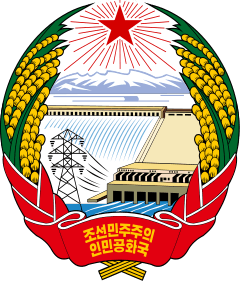 | ||||||||||||||||||||||||||||||||||||||||||
|
||||||||||||||||||||||||||||||||||||||||||
|
| ||||||||||||||||||||||||||||||||||||||||||
His son Kim Jong-un was announced as North Korea's next leader with the title of "The Great Successor" during the same newscast. Jong-il's funeral was held on 28 December in Pyongyang, with a mourning period lasting until the following day.[3]
Announcement
| Wikinews has related news: |
North Korean State media did not report Kim Jong-il's death until 51 hours after it occurred, apparently due to the political jockeying and discussions that surrounded the official version of Jong-il's legacy, as well as agreeing upon the membership of the Funeral Committee of Kim Jong-il.[4] On the morning of 19 December, all work units, schools, government agencies, and military personnel were informed of a major announcement to take place at noon. At noon, Ri Chun-hee, a Korean Central Television news anchor, clad in full black traditional Korean clothing, announced the death of Kim Jong-il. Ri had previously announced the death of Kim Il-sung in 1994. During the announcement, a portrait of a smiling, idealized image of Kim Jong-il was released, continuing the tradition of issuing official posthumous portraits of supreme leaders of North Korea after their death.
Following the official notice, a male news anchor wearing a suit and black tie proceeded to announce the entire funeral committee of Kim Jong-il in order of the rankings established by the authorities. The committee had 233 names; Kim Jong-un was ranked first.[5]
However, it was reported in December 2012 by South Korean media that he had died in a fit of rage over construction faults in a crucial power plant project at Huichon in Jagang Province.[6]
Speculation by South Korea
The head of South Korea's National Intelligence Service said surveillance footage revealed that Kim's personal train, on which he is said to have died, did not move over the weekend. This implied that the train was stationary when North Korean authorities claimed he had died.[7][8] According to editors of The Chosun Ilbo newspaper, it was reported circumstances surrounding Kim's death were inconsistent with what would be generally expected during official business trips: specifically inclement weather conditions were present and the time of day when Kim was supposedly travelling conflicted with his usual circadian rhythm. Furthermore, a low number of witnesses observed the events.[9]
Reactions
Korean peninsula

Korean Central News Agency announced the news, stating on 19 December:
The body of National Defense Commission Chairman Kim will lie in state at Kumsusan Memorial Palace during the period of mourning from the 17th to the 29th. Visitors will be received between the 20th and 27th. The ceremony for his parting will be performed on the 28th in Pyongyang. Central memorial meetings to honor Chairman Kim will open on the 29th. At that time, in Pyongyang and sites in every province, there will be an artillery salute and three minutes of silence, and all official vehicles and vessels will sound their horns.
Images showed that in the streets of Pyongyang, many people wept over Kim's death.[3][10] People could be seen gathering to pay their respects, some kneeling, some wailing, and some beating the ground with their fists.[11]
The BBC reported that the Korean Central News Agency said people were convulsing with pain and despair at their loss, but would unite behind his successor Kim Jong-un. They said that all party members, military men, and the public should faithfully follow the leadership of comrade Jong-un and protect and further strengthen the unified front of the party, military, and the public.[3]
Workplaces and local government offices have organised meetings to create a proper atmosphere of mourning. People's Units have emphasised the Last Instructions of Kim Jong-il and groups from schools and workplaces have been visiting statues of Kim Il-sung and other major memorials to pay their respects.[12]

After the death was announced, the South Korean military was put on high alert.[13] The South's National Security Council, worried that political jockeying in North Korea could destabilise the region, also convened for an emergency meeting.[3] President Lee Myung-bak cancelled the rest of his Monday schedule and in a statement, declared, "[f]or the sake of the future of the Republic of Korea, peace and stability on the Korean Peninsula is more important than anything else. It should not be threatened by what has happened. We must make thorough preparations to maintain peace and stability and continue to work closely with the international community ... All citizens are asked to go about their lives without wavering so that peace and stability on the Korean Peninsula will not be hampered".[14] No government officials from Seoul paid condolences, according to the Unification Ministry. Lee Hee Ho, the 89-year-old widow of former South Korean President Kim Dae-jung, and Hyundai Group Chairwoman Hyun Jeong-eun led a private group of 18 South Koreans on a two-day visit, where state media showed them being greeted by Jong-un on 26 December.[15]
Supranational bodies


Governments

.svg.png)



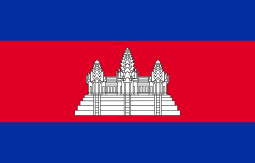
.svg.png)



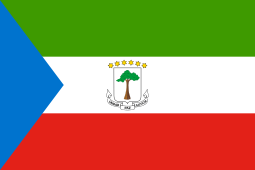
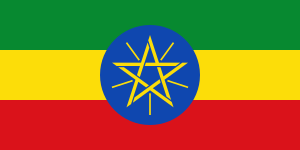




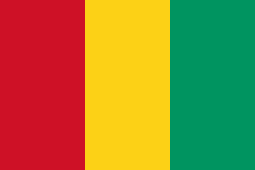








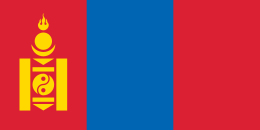

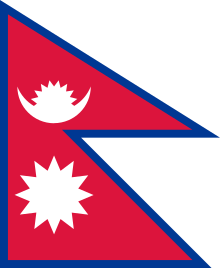


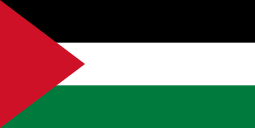











Parties and organizations

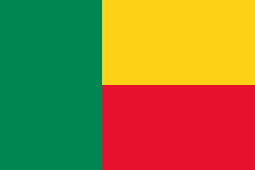

.svg.png)






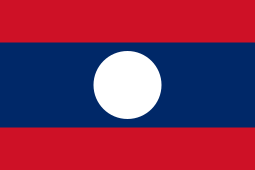



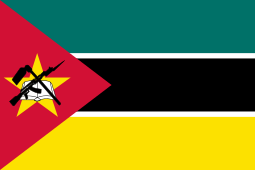
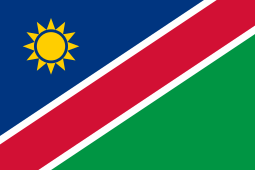





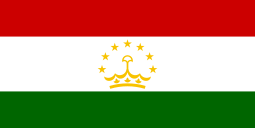


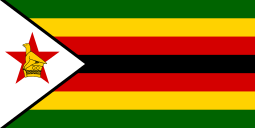
Financial markets
Asian stock markets fell soon after the announcement of Kim's death, echoing concerns about regional instability.[3] At the opening of the European markets, stocks also fell, but Indonesian and United States stock markets rose after the announcement of Kim Jong-il's death.[85][86][87]
Funeral committee
North Korea announced a 232-member[88] funeral committee headed by Kim Jong-un that planned and oversaw Jong-il's funeral, which took place on 28 December.[89] Observers believe the order of names on the list gives clues to the rankings of individuals in the regime's power structure with Kim Jong-un's position on top a further indication that he is Jong-il's successor as supreme leader.[90][91] According to Kim Keun-sik of Kyungnam University, "The list is in the order of members of the standing committee of the Politburo, then members and candidate members. It shows that the party will be stronger power than the military," because Kim Jong-il's brother-in-law Jang Song-taek or O Kuk-ryol, the vice-chairman of the National Defense Commission, are listed further down."[90]
The National Funeral Committee released the following details on 19 December 2011:
[The National Funeral Committee] notifies that it decided as follows so that the whole party, army, and people can express the most profound regret at the demise of leader Kim Jong Il and mourn him in deep reverence:
- His bier will be placed at the Kumsusan Memorial Palace.
- Mourning period will be set from Dec. 17 to 29, Juche 100 (2011) and mourners will be received from December 20 to 27.
- A farewell-bidding ceremony will be solemnly held in Pyongyang on December 28.
- A national memorial service for Kim Jong Il will be held on December 29.
- Mourning guns will be boomed in Pyongyang and in provincial seats timed to coincide with the national memorial service in Pyongyang and all the people will observe three minutes’ silence and all locomotives and vessels will blow sirens all at once.
- All institutions and enterprises across the country will hold mourning events during the mourning period and all provinces, cities and counties will hold memorial services timed to coincide with the national memorial service in Pyongyang.
- The institutions and enterprises will hoist flags at half-mast and musical and all other entertainments will be refrained.
- Foreign mourning delegations will not be received.
— Korean Central News Agency, 19 December 2011[92]
Members
The 232 members of the funeral committee were:[93]
- Kim Jong-un
- Kim Yong-nam
- Choe Yong-rim
- Ri Yong-ho
- Kim Yong-chun
- Jon Pyong-ho
- Kim Kuk-thae
- Kim Ki-nam
- Choe Thae-bok
- Yang Hyong-sop
- Kang Sok-ju
- Pyon Yong-rip
- Ri Yong-mu
- Kim Kyong-hui
- Kim Yang-gon
- Kim Yong-il
- Pak To-chun
- Choe Ryong-hae
- Jang Song-thaek
- Ju Kyu-chang
- Kim Rak-hui
- Thae Jong-su
- Kim Phyong-hae
- Kim Jong-gak
- U Tong-chuk
- Kim Chang-sop
- Mun Kyong-dok
- Ri Thae-nam
- O Kuk-ryol
- Kim Chol-man
- Ri Ul-sol
- Jon Ha-chol
- Kang Nung-su
- Ro Tu-chol
- Jo Pyong-ju
- Han Kwang-bok
- Paek Se-bong
- Ri Yong-su
- Choe Hui-jong
- O Il-jong
- Kim Jong-im
- Chae Hui-jong
- Kim Ki-ryong
- Jang Pyong-gyu
- Kim Pyong-ryul
- Hong In-bom
- Ri Man-gon
- Ju Yong-sik
- Kwak Pom-gi
- O Su-yong
- Ro Pae-gwon
- Pak Thae-dok
- Kim Hi-thaek
- Kang Yang-mo
- Rim Kyong-man
- Kim Kyong-ok
- Kim Myong-guk
- Kim Won-hong
- Hyon Chol-hae
- Han Tong-gun
- Jo Kyong-chol
- Pak Jae-gyong
- Pyon In-son
- Yun Jong-rin
- Jong Myong-do
- Ri Pyong-chol
- Choe Sang-ryo
- Kim Yong-chol
- Kang Phyo-yong
- Kim Hyong-ryong
- Ri Yong-hwan
- Kim Chun-sam
- Choe Kyong-song
- Ri Myong-su
- Jon Hui-jong
- Ri Yong-gil
- Hyon Yong-chol
- Choe Pu-il
- Yang Tong-hun
- Ri Pong-juk
- Kim Song-chol
- Pak Kwang-chol
- Ri Pyong-sam
- Jon Chang-bok
- O Kum-chol
- Kim In-sik
- Kim Song-dok
- Ryo Chun-sok
- Pak Sung-won
- Ri Yong-chol
- Pak Ui-chun
- Kim Hyong-sik
- Kim Thae-bong
- Jon Kil-su
- Ri Mu-yong
- An Jong-su
- Ri Ryong-nam
- Ryu Yong-sop
- Pak Myong-chol
- Kim Yong-jin
- Jang Chol
- Song Ja-rip
- Kim Jong-suk
- Kang Tong-yun
- Kim Pyong-ho
- Cha Sung-su
- Ryang Man-gil
- Yun Tong-hyon
- Ko Pyong-hyon
- Ri Pong-dok
- Pak Jong-gun
- Choe Yong-dok
- Jong In-guk
- Jon Ryong-guk
- Ri Hyong-gun
- Hwang Sun-hui
- Paek Kye-ryong
- Kim Tong-il
- Kim Tong-i
- Ri Jae-il
- Pak Pong-ju
- Jong Myong-hak
- Kang Kwan-il
- Hwang Pyong-so
- Kwon Hyok-bong
- Hong Sung-mu
- Kim U-ho
- Han Chang-sun
- Ri Chun-il
- Ri Thae-sop
- Jo Song-hwan
- Tong Yong-il
- Ri Chang-han
- Ko Su-il
- Ri Kuk-jun
- Sin Sung-hun
- Ri Thae-chol
- Yang In-guk
- Ri Hi-su
- Ri Chol
- Hyon Sang-ju
- Ri Myong-gil
- Ro Song-sil
- Tong Jong-ho
- Kang Min-chol
- Kim Hui-yong
- Jo Yong-chol
- Hwang Hak-won
- An Tong-chun
- Paek Ryong-chon
- Hong Kwan-sun
- Ri Su-yong
- Kim Yong-ho
- Pang Ri-sun
- Choe Chun-sik
- Ri Je-son
- Ri Sang-gun
- Ri Hong-sop
- Cha Yong-myong
- Kang Kwan-ju
- Thae Hyong-chol
- Kim Pyong-hun
- Kim Kye-gwan
- Han Chang-nam
- Kim Chang-myong
- Jon Chang-rim
- O Chol-san
- Son Chong-nam
- Jong Un-hak
- Cha Kyong-il
- Kang Ki-sop
- Choi Tae-il
- Choe Yong-do
- Ri Yong-ju
- Jon Kwang-rok
- Ri Chan-hwa
- So Tong-myong
- Jon Song-ung
- Ji Jae-ryong
- Kim Yong-jae
- Ri Yong-ho
- Hong So-hon
- Kim Tong-il
- Kim Tong-un
- Kim Pong-ryong
- Jo Jae-yong
- Choe Chan-gon
- Ryom In-yun
- Kim Chon-ho
- Jang Ho-chan
- Song Kwang-chol
- Ri Ki-su
- Ri Jong-sik
- Choe Hyon
- Jang Myong-hak
- Kang Hyong-bong
- Kim Chung-gol
- Kim Yong-gwang
- Choe Kwan-jun
- Jang Yong-gol
- Kim Myong-sik
- Ho Song-gil
- No Kwang-chol
- Jong Pong-gun
- Pak Chang-bom
- Choe Pong-ho
- Jong Mong-phil
- Jon Kyong-son
- Ri Song-gwon
- Choe Yong
- Kim Thae-mun
- Kim Yong-suk
- Cha Jin-sun
- Ri Min-chol
- Ri Il-nam
- Kim Chang-su
- Pak Myong-sun
- Choe Pae-jin
- Kim Chol
- Sim Chol-ho
- O Ryong-il
- Kye Yong-sam
- Ryu Hyon-sik
- Ko Myong-hui
- Pang Yong-uk
- Jang Jong-ju
- Ho Kwang-uk
- Ji Tong-sik
- Jong Pong-sok
- Choe Kwon-su
- Kim Yong-dae
- Ryu Mi-yong
Lying in state
On 20 December, Jong-il's embalmed body lay in state in a glass coffin at the Kumsusan Memorial Palace, where his father Kim Il-sung is also interred, for an 11-day mourning period prior to the funeral.[94][95] Like his father, Kim's body was covered in a red flag and surrounded by blossoms of his namesake flowers, red kimjongilia. It is expected that the body will be placed next to his father's bier following the funeral and mourning period. As solemn music played, Kim Jong-un entered the hall to view his father's bier, surrounded by military honour guards. He observed a moment of solemn silence, then circled the bier, followed by other officials.[96]
On Saturday 24 December Kim Jong-un made a third visit to the palace where his father's body is lying in state. At this broadcast, Jang Sung-taek, whom South Korean intelligence assumed would play larger roles supporting the heir, stood with military uniform near young Kim, who wept this time, as he paid respects to Kim Jong-il's body lying in state.
Funeral and memorial service
| External video | |
|---|---|
The funeral itself occurred on 28 December. The 40-kilometre (25 mi), 3-hour funeral procession was covered in snow (which local newscasters described as "heaven's tears") as soldiers beat their chests and called out "Father, Father." A Lincoln Continental limousine[97] carried a giant portrait of Jong-il. Jong-il's casket, draped by the Korean Workers' Party flag, was carried on top of another Lincoln Continental hearse while Kim Jong-un and his uncle Jang Sung-taek were immediately behind. Army chief of the general staff Ri Yong-ho and defence minister Vice-Marshal Kim Yong-chun walked along the opposite side of the vehicle during the procession segments in the Kumsusan Memorial Palace.[98][99] The procession returned to Kumsusan Palace where Jong-un stood flanked by the top party and military officials who are expected to be his inner circle of advisers as rifles fired 21 times, then saluted again as goose-stepping soldiers carrying flags and rifles marched by the palace square.[100] Reportedly, Jong-il's body will be embalmed and put on display indefinitely in the manner of Kim Il-sung and other Communist leaders such as Lenin, Mao, and Ho Chi Minh.[101]
The convoy during the funeral procession was composed of lead patrol cars, the funeral hearse and its escorts, military escorts, motorised colour guards, an OB van of Korean Central Television, various cars (including a fleet of black Mercedes), and trucks carrying wreaths and five military bands from the KPA.
On the day of the memorial service, 29 December, Chairman of the Presidium, Kim Yong-nam, gave an address to mourners gathered in Kim Il-sung Square.[102]
Kim Young-nam told mourners that "The great heart of comrade Kim Jong-il has ceased to beat... such an unexpected and early departure from us is the biggest and the most unimaginable loss to our party and the revolution," and that North Korea would "transform the sorrow into strength and courage 1,000 times greater under the leadership of comrade Kim Jong-un."[102]
The chairman also affirmed Kim Jong-un's position as his father's successor saying "Respected Comrade Kim Jong-un is our party, military and country’s supreme leader who inherits great comrade Kim Jong-il’s ideology, leadership, character, virtues, grit and courage".[103]
General Kim Jong-gak addressing the memorial service on behalf of the military, saying "Our people's military will serve comrade Kim Jong-un at the head of our revolutionary troops and will continue to maintain and complete the Songun accomplishments of great leader Kim Jong-il". Songun refers to Kim Jong-il's policy of prioritising the "military first" in economic decisions.[102]
Kim Jong-un did not make an address but stood with his head bowed, watching from a balcony of the Grand People's Study House, overlooking the square. He was flanked by his aunt, Kim Kyong-hui, her husband, Jang Sung-taek,[104] and senior party and military officials.[103]
After the speeches, and a nationwide observance of three-minute silence, a row of heavy artillery guns were fired off in a 21-gun salute followed by a cacophony of sirens, horns and whistles sounded off simultaneously from trains and ships across the country to mark the end of the mourning period.[102][105][106] The assembly concluded with a military band playing The Internationale.[107] State television then broadcast a military choir and wind band performing The Song of General Kim Jong Il to formally conclude.[108]
Kim Jong-un's elder brothers, Kim Jong-nam and Kim Jong-chol, are not known to have been in attendance either at the lying in state or on either date, the funeral or the memorial service.[99][102][103]
The funeral showcased seven officials who are believed to be mentors or major aides to Kim Jong-un: Jang Song-taek, Mr. Kim's uncle and a vice-chairman of the National Defense Commission; Kim Ki-nam, North Korea's propaganda chief; Choe Tae-bok, the party secretary in charge of external affairs; Vice Marshal Ri Yong-ho, head of the military's general staff; Kim Yong-chun, the defence minister; Kim Jong-gak, a four-star general whose job is to monitor the allegiance of other generals; and U Dong-chuk, head of the North's secret police and spy agency.[109]
On 1 January 2012 the Japanese daily Yomiuri Shimbun reported that Kim Jong-Nam secretly flew to Pyongyang from Macau on 17 December 2011, after learning about his father's death that day and is presumed to have accompanied Kim Jong-Un when paying his last respects to their father. He left after a few days to return to Macau and was not in attendance at the funeral in order to avoid speculation about the succession.[110]
According to Daily NK, anyone who did not participate in the organised mourning sessions or did not seem genuine enough in their sorrow has been sentenced to at least six months in a labour camp.[111] Mourners were also barred from wearing hats, gloves or scarves even though the temperature that day was −2.4 °C (27.7 °F)—presumably so authorities could check to make sure they were displaying sufficient grief.[112] North Korea angrily denied this accusation, blaming it on "reptile media" in the pay of the South Korean government.[113] A photo slideshow from The Los Angeles Times does show multiple mourners with gloves and scarves.[114]
Reports of mourning
The Korean Central News Agency (KCNA) claimed that strange natural phenomena occurred in North Korea around the time of Kim Jong-il's death:
On the morning of Dec. 17 layers of ice were broken on Lake Chon on Mt. Paektu, shaking the lake with big noise.
The Group for Comprehensive Exploration of Lake Chon on Mt. Paektu said it was the first time that such big noise was heard from the ridge of Janggun Peak and the lake.
The temperature on Mt. Paektu that day registered 22.4 degrees Celsius below zero and there was strong wind accompanied by snowstorm measuring 18 meters per second.
The snowstorm stopped blowing all of a sudden from dawn of Tuesday and heavy clouds were seen hanging around Hyangdo Peak.
At around 8:05 am the sky began turning red with sunrise on the horizon. The peaks looked like a picture for wide and thick glow.
Kim Jong Il's autographic writings "Mt. Paektu, holy mountain of revolution. Kim Jong Il." carved on the mountain, in particular, were bright with glow.
This phenomenon lasted till 5:00 pm.
Glow was seen atop Jong Il Peak for half an hour from 16:50 on Dec. 19 when the nation was shocked by the news of the leader's demise. This was the first of its kind in dozens of years since the observation of the area was started.
A natural wonder was also observed around the statue of the President standing on Tonghung Hill.
At around 21:20 Tuesday a Manchurian crane was seen flying round the statue three times before alighting on a tree. The crane stayed there for quite a long while with its head drooped and flew in the direction of Pyongyang at around 22:00.
Observing this, the director of the Management Office for the Hamhung Revolutionary Site, and others said in union that even the crane seemed to mourn the demise of Kim Jong Il born of Heaven after flying down there at dead of cold night, unable to forget him.— KCNA[115]
In the past, the North Korean government has been known to encourage stories of miraculous deeds and supernatural events credited to Kim Il-Sung and Kim Jong-Il. KCNA also claimed that more than five million North Koreans, more than 25% of the national population, had shown up to mourn Kim.
References
- Wober, Rafael (19 December 2011). "North Korea mourns Kim Jong Il; son is 'successor'". Deseret News. Associated Press. Retrieved 13 August 2019.
- "North Korea's Kim Had 'Serious Heart Shock' Following Long Illness: Text". Bloomberg. 19 December 2011. Retrieved 20 December 2011.
- "North Korean leader Kim Jong-il dies 'of heart attack'". BBC News. 19 December 2011. Retrieved 19 December 2011.
died on Saturday
- "Succession in North Korea: Grief and fear". The Economist. 31 December 2011. Retrieved 31 December 2011.
- "National Funeral Committee Formed". Archived from the original on 29 May 2012. Retrieved 31 December 2011.
- "Late North Korean leader Kim Jong Il died 'in a fit of rage' over damages at crucial power plant project: report". New York Daily News. 31 December 2012. Retrieved 31 December 2012.
South Korea media reports the 'Supreme Commander' suffered a heart attack after learning that a hydroelectric dam had suffered a major leak.
- Glionna, John (21 December 2011). "South Korea questions story of Kim Jong Il's death". The Los Angeles Times. Archived from the original on 22 December 2011. Retrieved 22 December 2011.
- Nelson, Dean (21 December 2011). "Kim Jong-il's death 'may have been stage managed'". The Telegraph. London. Archived from the original on 22 December 2011. Retrieved 22 December 2011.
- "Did Kim Jong-il Really Die on a Train?". The Chosun Ilbo. 21 December 2011. Archived from the original on 6 January 2012. Retrieved 22 December 2011.
- McCurry, Justin (19 December 2011). "North Koreans' reaction to Kim Jong-il's death is impossible to gauge". The Guardian. London. Retrieved 19 December 2011.
- "Kim Jong Il dead: Watch the moment his death was announced by sobbing newsreader". Daily Mirror. 19 December 2011. Retrieved 19 December 2011.
- "People Cried and Wailed", Lee Seok Young, Daily NK, 19 December 2011
- Smith, Matt (19 December 2011). "North Korea's Kim Jong Il dies; South goes on high alert". CNN. Retrieved 19 December 2011.
- "World reacts to Kim Jong Il's death". CNN. 19 December 2011. Retrieved 19 December 2011.
- "North Korea May Fete 'Touching Drama' for Kim Jong Il Funeral". Yahoo News. 26 December 2011. Archived from the original on 21 July 2012. Retrieved 28 December 2011.
- "EU 'monitoring' events after Kim Jong-Il death". eubusiness.com. 19 December 2011. Retrieved 19 December 2011.
- "Polskie kondolencje po śmierci Kim Dzong Ila" [Polish condolences after the death of Kim Jong Il] (in Polish). Rzeczpospolita. 21 December 2011. Retrieved 24 December 2011.
- "Statement attributable to the Spokesperson for the Secretary-General on the passing of Kim Jong-il". United Nations. 19 December 2011. Retrieved 19 December 2011.
- "Armenian President condoles with the deceased – newspaper". News.am. 21 December 2011. Retrieved 21 December 2011.
- "N. Korean leader Kim dead: state TV". Spacedaily.com. Retrieved 19 December 2011.
- "Azerbaijan's President offers condolences over death of Kim Jong-il". Azerbaijan Press Agency. 21 December 2011. Archived from the original on 7 April 2012. Retrieved 21 December 2011.
- "Bangladesh mourns loss of "dear friend" in Kim Jong Il". Monsters and Critics. 20 December 2011. Archived from the original on 7 September 2012. Retrieved 20 December 2011.
- "Alexander Lukashenko issues condolences over death of Kim Jong il". tvr.by. Archived from the original on 28 June 2013. Retrieved 19 December 2011.
- "Curtain Closes on Kim Jong Il". Phnom Penh Post. 20 December 2011. Retrieved 20 December 2011.
- "Stephen Harper's scathing remembrance of North Korea's Kim Jong-il". National Post. 19 December 2011. Retrieved 19 December 2011.
- "The China Daily "China urges stability on Korean Peninsula", 21 December 2011". Archived from the original on 4 January 2014. Retrieved 16 February 2013.
- "World Reacts to Death of Kim Jong Il". Fox News. Associated Press. 19 December 2011. Retrieved 25 December 2011.
- "Samo 5 demokratskih država izrazilo sućut S.Koreji. Hrvatska je među njima!". Dalje.com. 10 January 2012. Archived from the original on 2 April 2015.
- "Condolatory Message from Croatian President". Archived from the original on 12 October 2014. Retrieved 24 January 2012.
- "Cuba declares 3 days of mourning for Kim". Associated Press. 20 December 2011. Retrieved 20 December 2011.
- "Death of Kim Jong Il: World continues to send condolence messages". Weekly Blitz. 22 December 2011. Archived from the original on 27 January 2013. Retrieved 23 December 2011.
- "Halonen wishes for reforms in North Korea". YLE. 19 December 2011. Retrieved 19 December 2011.
- "Kim Jong-il death: World reaction in quotes". BBC News. 19 December 2011. Retrieved 19 December 2011.
- A Külügyminisztérium közleménye Kim Jong-il észak-koreai vezető halálával kapcsolatban Archived 11 January 2012 at the Wayback Machine Külügyminisztérium, 19 December 2011 (in Hungarian)
- "Prime Minister Manmohan Singh condoles demise of Kim Jong II". The Economic Times. 20 December 2011. Retrieved 21 December 2011.
- India's Foreign Relations - Documents, 2011; Geetika Publishers, Avatar Singh Bhasin (Ed.)
- "Statement of the Government of the Republic of Indonesia on the Passing Away of the Supreme Leader of the Democratic People's Republic of Korea, H.E. Mr. Kim Jong-Il". kemlu.go.id. Indonesian Ministry of Foreign Affairs. 19 December 2011. Archived from the original on 6 April 2012.
- "The Journal" website news report, 20 December 2011, "Should Ireland send a message of sympathy to North Korea?"
- "Press Release on the Demise of Kim Jong-il, Supreme Leader of the Democratic People's Republic of Korea (North Korea)". Ministry of Foreign Affairs, Malaysia. 20 December 2011. Retrieved 20 December 2011.
- "Condolence Letter Has Been Sent On The Passing of Kim Jong-Il". 21 December 2011. Retrieved 21 December 2011.
- Myanmar Radio and Television news report in respect of 24 December 2011 and published on MRTV-3 website
- "Myanmar sees change in North Korea" news report of AFP on 20 December 2011 as produced on Ethnic Nationalities Council website.
- "President, PM express sorrow". The Rising Nepal. Archived from the original on 7 April 2012. Retrieved 21 December 2011.
- "Ortega laments death of 'dear leader'". Nicaragua Dispatch. 19 December 2011. Retrieved 21 December 2011.
- "Message of Condolences to Kim Jong Un from Pakistani President". NK Aggregator. 22 December 2011. Archived from the original on 12 March 2017. Retrieved 22 December 2011.
- "Condolences to Kim Jong Un from Palestinian President". Korea News Service (KNS). 22 December 2011. Archived from the original on 12 October 2014. Retrieved 22 December 2011.
- "Statement of the Philippine Government on the passing away of the leader of the Democratic People's Republic of Korea, Kim Jong-Il". Official Gazette of the Republic of the Philippines. Department of Foreign Affairs. 19 December 2011. Retrieved 20 December 2011.
- "Statement after the death of Kim Jong Il". Ministry of Foreign Affairs of the Republic of Poland. 19 December 2011. Retrieved 24 December 2011.
- "All eyes on North Korea after death of Kim Jong-il". Polish Radio External Service. 19 December 2011. Retrieved 24 December 2011.
- "HH the Emir Sends Condolences to North Korean President". Qatar News Agency. 19 December 2011. Retrieved 19 December 2011.
- "Medvedev expresses condolences on death of DPRK top leader". China Daily. 19 December 2011. Archived from the original on 24 September 2015. Retrieved 19 December 2011.
- "Syria offers condolences for death of Kim Jong-Il". NOW Lebanon. 23 December 2011. Archived from the original on 3 January 2012. Retrieved 23 December 2011.
- "Ma urges calm in wake of Kim's death". Taipei Times. 19 December 2011. Retrieved 19 December 2011.
- Cancel, Daniel (19 December 2011). "Venezuela Expresses 'Sincere Sorrow' for Death of Kim Jong Il". Bloomberg Businessweek. Retrieved 19 December 2011.
- "Vietnam expresses "deepest condolences" on death of DPRK's top leader". Xinhua News Agency. 19 December 2011. Retrieved 19 December 2011.
- "Memorial Services for Kim Jong Il Held Abroad". Archived from the original on 12 October 2014. Retrieved 5 January 2012.
- "Wreath from Benin Political Party". Archived from the original on 29 May 2012. Retrieved 2 January 2012.
- "Foreign Party and Organizations Mourn Demise of Kim Jong Il". Archived from the original on 29 May 2012. Retrieved 2 January 2012.
- "Personages of Different Countries Visit DPRK Embassy". Archived from the original on 6 October 2014. Retrieved 5 January 2012.
- "Condolatory Messages from Canadian Party Leader". Archived from the original on 29 May 2012. Retrieved 2 January 2012.
- "Cambodian Parliamentary Delegations Visits DPRK Embassy". Archived from the original on 12 October 2014. Retrieved 5 January 2012.
- "Message of Condolences from Cambodian Party Leader". Archived from the original on 12 October 2014. Retrieved 5 January 2012.
- "Communist Party of Bohemia and Moravia (KSCM) | The Democratic Society". Europe.demsoc.org. 20 February 2014. Archived from the original on 6 October 2015. Retrieved 6 October 2015.
- "Condolatory Messages from Egypt's Party Leader". Archived from the original on 29 May 2012. Retrieved 2 January 2012.
- "Condolatory Messages from Italian Party Leader". Archived from the original on 29 May 2012. Retrieved 2 January 2012.
- "Condolences over death of Kim Jong Il". Lao News Agency. Archived from the original on 7 January 2012. Retrieved 21 December 2011.
- "Condolatory Messages from Foreign Political Figures". Archived from the original on 29 May 2012. Retrieved 2 January 2012.
- "More Foreign Party Leaders Visit DPRK Embassy". Archived from the original on 29 May 2012. Retrieved 2 January 2012.
- "Condolences from Different Countries". Archived from the original on 10 January 2012. Retrieved 5 January 2012.
- "Condolatory Messages from Mongolian Party Official". Archived from the original on 29 May 2012. Retrieved 2 January 2012.
- "Mozambique's ruling party 'saddened' by death of Kim Jong-Il". Ipotnews. 20 December 2011. Retrieved 21 December 2011.
- "Message of Condolences from SG of SWAPO Party". Archived from the original on 12 October 2014. Retrieved 5 January 2012.
- "Condolatory Messages from Palestinian Party Leader". Archived from the original on 29 May 2012. Retrieved 2 January 2012.
- "Wreaths from Russia's Parties, Art Groups, Personages". Archived from the original on 29 May 2012. Retrieved 2 January 2012.
- "ANC Officials Visit DPRK Embassy". Archived from the original on 12 October 2014. Retrieved 5 January 2012.
- "Wreath from ANC". Archived from the original on 12 October 2014. Retrieved 5 January 2012.
- "Statement on the passing away of the DPRK chairperson of the national dfefence council and leader of the Korean people: Comrade Kim Jong Il. - Mail & Guardian" (PDF). Mg.co.za. Archived from the original (PDF) on 31 January 2012.
- "Condolatory Messages from Syrian Political Figure". Archived from the original on 29 May 2012. Retrieved 2 January 2012.
- "GOP Candidates React to Death of Kim Jong IL: He will not be missed". Fox News. 19 December 2011.
- "WWP sends condolences to Workers' Party of Korea". Workers.org. 21 December 2011. Retrieved 23 April 2012.
- "Voice of Revolution". Usmlo.org. 19 December 2011. Retrieved 23 April 2012.
- "The Worker – Message of Condolence Over the Passing of Kim Jong Il". Workersparty.org. 17 December 2011. Retrieved 23 April 2012.
- "Unity Day is hollow – Analysts". Thestandard.co.zw. 24 December 2011. Retrieved 23 April 2012.
- "5th Brigade victims celebrate, Zanu-PF mourns death Kim Jong I1". Zimdiaspora.com. 20 December 2011. Archived from the original on 1 August 2012. Retrieved 23 April 2012.
- "Asian stocks fall, dollar up after death of Kim Jong-il". Reouter. 19 December 2011. Retrieved 20 December 2011.
- Kollmeyer, Barbara (19 December 2011). "US Stock-Market Futures Rise; N Korea In Focus". Wall Street Journal. Retrieved 20 December 2011.
- "Regional fails, IHSG becomes rises". TEMPO. 20 December 2011. Retrieved 20 December 2011.
- "N. Korean leader dies at 69 after decades of iron-fist rule". Yonhap News Agency. 19 December 2011. Retrieved 20 December 2011.
- Fackler, Martin (19 December 2011). "Young Heir Faces Uncertain Transition in North Korea". The New York Times. Retrieved 19 December 2011.
- "Clues from Kim Jong-il Funeral List". The Chosunilbo. 23 December 2011. Retrieved 23 December 2011.
- Branford, Becky (21 December 2011). "Powers behind N Korea's new 'general'". BBC News. Retrieved 23 December 2011.
- "Notice of National Funeral Committee". Korean Central News Agency. 19 December 2011. Retrieved 20 December 2011.
- "KJI Funeral Rankings comparison" (XLSX). NK News. December 2011. Ranking. Retrieved 7 September 2018.
- Wober, Rafael (20 December 2011). "Kim Jong Il body displayed, NKorea media hail son". Associated Press. Retrieved 20 December 2011.
- "North Korea mourns Kim Jong Il; son is 'successor'". Retrieved 19 December 2011.
- Kim Jong-un pays respects to Kim Jong-il's body as it is displayed in North Korea, The Telegraph
- Americans Are Prominent at the Funeral of Kim Jong-il
- "North Korea holds two-day state funeral for Kim Jong-il". BBC News. 28 December 2011. Retrieved 28 December 2011.
- Salmon, Andrew; Blair, David (28 December 2011). "Kim Jong-il funeral: Kim Jong-un steps up as nation mourns". Daily Telegraph. London. Retrieved 28 December 2011.
- Thousands mourn at N. Korean leader’s funeral The Associated Press Posted : Wednesday 28 December 2011 8:48:57
- Salmon, Andrew (28 December 2011). "Kim Jong-il: a lavish North Korean funeral beneath a leaden sky". Daily Telegraph. London. Retrieved 29 December 2011.
- "North Korea holds memorial service for Kim Jong-il". BBC News. 28 December 2011. Retrieved 28 December 2011.
- "Kim Jong Il son declared 'supreme leader' of North Korea's people, party and military". Washington Post. 28 December 2011. Archived from the original on 10 December 2018. Retrieved 29 December 2011.
- "North Korea Calls Kim Jong Un 'Supreme Leader'". Associated Press. 29 December 2011. Archived from the original on 29 December 2011. Retrieved 29 December 2011.
- Mullen, Jethro (29 December 2011). "Thousands of North Koreans gather for Kim Jong Il memorial". CNN. Retrieved 29 December 2011.
- "Farewell ceremony held in Pyongyang". Xinhnua News Agency. 29 December 2011. Retrieved 29 December 2011.
- "Corée du Nord : Kim Jong-un nommé " leader suprême "". Radio-Canada. 29 December 2011. Retrieved 29 December 2011.
- "N. Korea Ends Mourning With Eulogies Heralding 'Kim Jong Un Era'". Business Week. 29 December 2011. Retrieved 29 December 2011.
- North Korea Declares Kim Jong-un Supreme Leader (NYT)
- "Kim's eldest in 'secret visit' to see body (AFP, January 1, 2012)". News.com.au. 1 January 2012. Retrieved 23 April 2012.
- Choi Song Min (11 January 2012). "Harsh Punishments for Poor Mourning". Daily NK. Retrieved 14 January 2012.
- Lee Seok Young (3 January 2012). "No Hats, No Scarves, No Gloves!". Daily NK. Retrieved 15 January 2012.
- Jiyeon Lee; Jethro Mullen (16 January 2012). "North Korea denies punishing citizens for not mourning enough". CNN. Retrieved 21 January 2012.
- Martin, Marc (19 December 2011). "North Korea's Kim Jong Il dead at 69". Los Angeles Times. Archived from the original (Photo Slideshow) on 22 July 2012. Retrieved 7 July 2012.
- "Natural Wonders Observed". Archived from the original on 7 January 2012. Retrieved 13 January 2012.
External links
- Chronological coverage at North Korean Economy Watch
- Route of the funeral procession at North Korean Economy Watch
